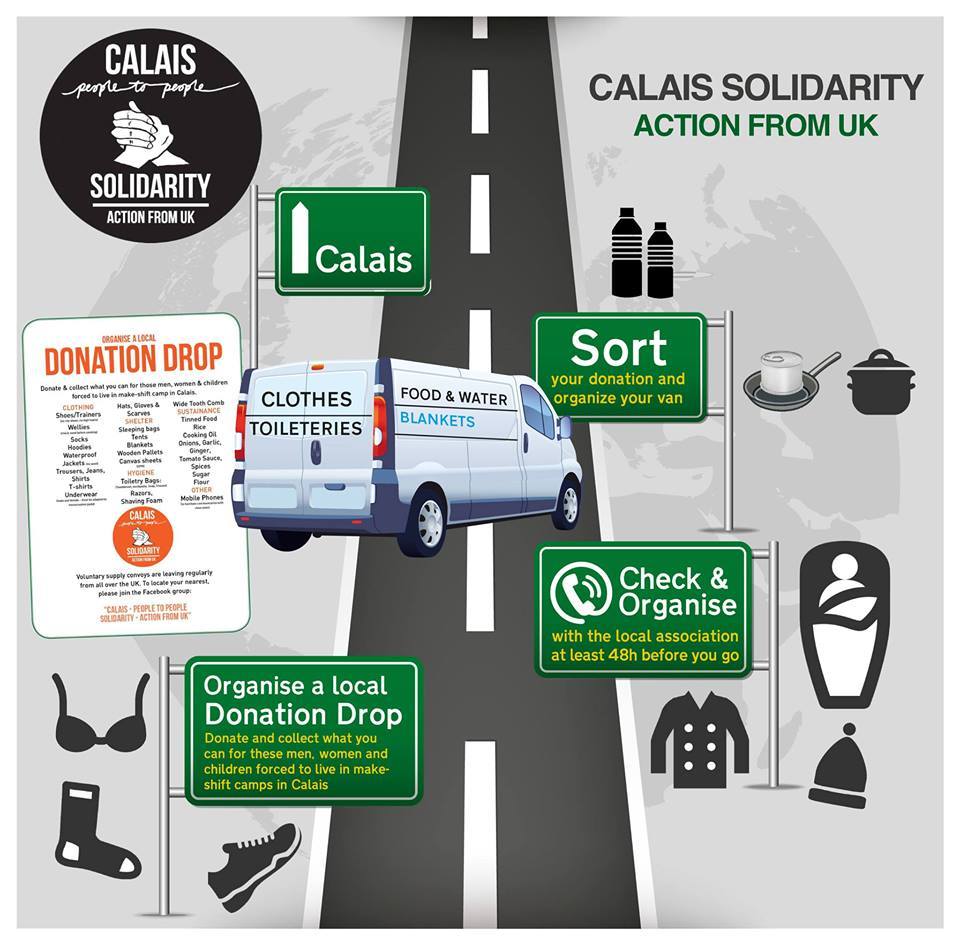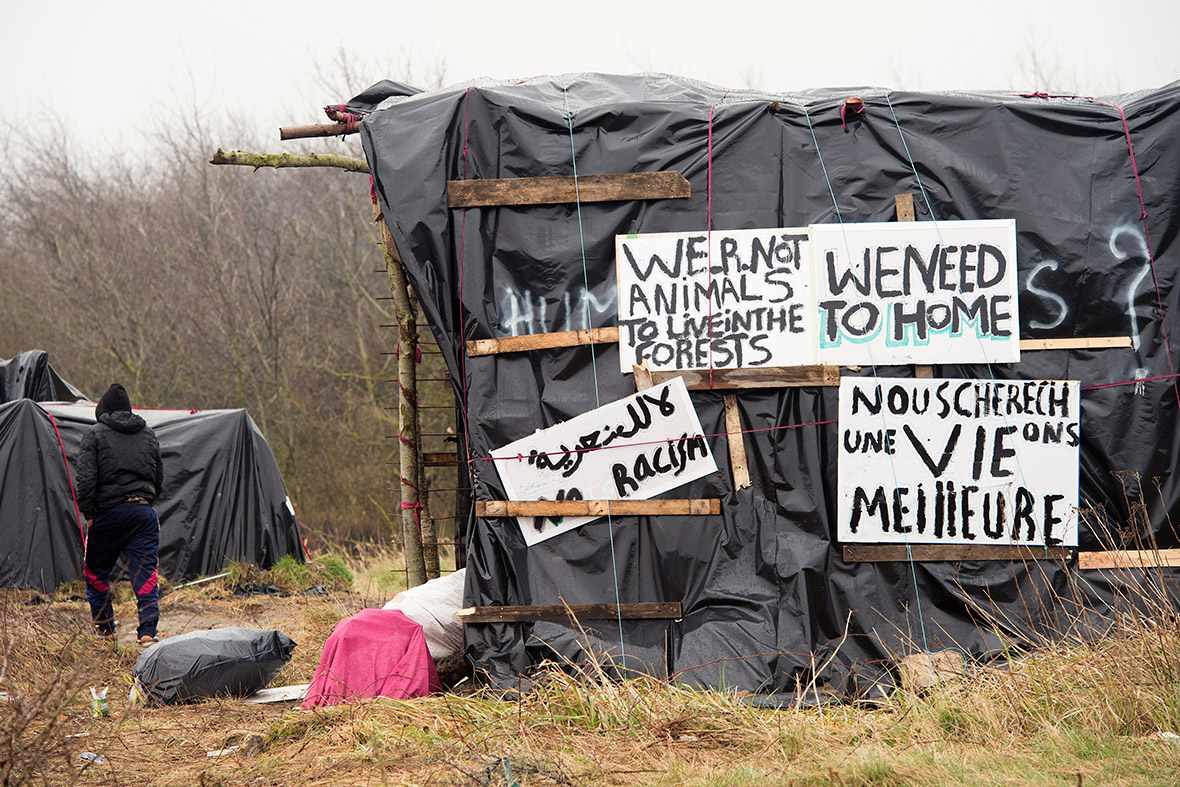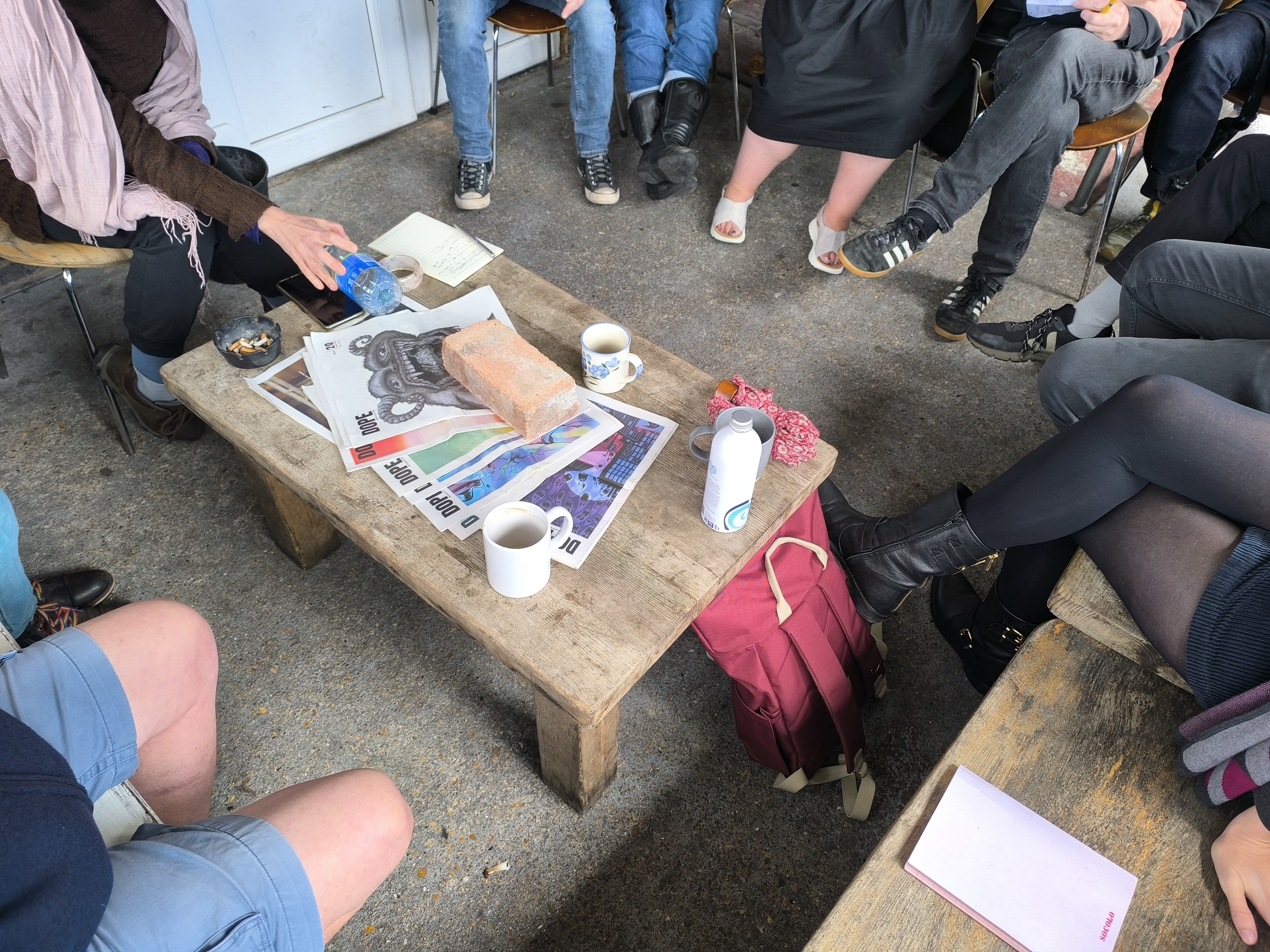Useful links at the bottom of the page. Use and share them!
News just in: thousands of people in the UK are self-organising to help migrants at European borders, mainly in Calais. Since the spring of this year, the British media has been full of people crossing and drowning in the Mediterranean and of the ‘problem’ of Calais; a problem manifested and presented in a number of ways; the suffering and squalor of ‘the Jungle’ camp, the persistent efforts of people living there to get into vehicles headed for ferries or the Tunnel, sometimes in terms of threat, often in terms of the inconvenience to the flows of capital and leisure. People in the UK have seen these images and responded. They are donating, collecting, cleaning, sorting and making plans to give material support to people at Europe’s borders – mainly in Calais but also in Hungary and Greece as well. At a party last weekend, three people I’d never met asked me if I was going to help out salvaging stuff from Leeds Festival. The Facebook group ‘Calais People to People Solidarity – Action from the UK’ was set up in the last week of August. On 29th August it had 5000 members – today on 4th September, 19,000. In front of me is a spreadsheet of 163 groups doing collections this week. 75,000 people say they are attending a solidarity demo this weekend in London. And all of this, by the way, before 2nd September, when all the major newspapers decided to print a picture of a drowned child on their front pages. Migrant solidarity is popular. What are the limits and opportunities of this amazing wave of action and compassion?

GRAPHIC: A graphic created by people organising as ‘Calais People To People Solidarity’
Charity vs solidarity, and the meaning of No Borders
An article by those involved in anticapitalist migrant action describes this upsurge of support as merely charitable, urging ‘enough of the sympathy’. Whilst I agree with their assertion that ‘the border is everywhere’, and believe we should and can act on this understanding of the crisis, I don’t believe this grassroots surge isn’t or can’t be a fighting politics. For a start, giving people things they need and can’t get any other way isn’t antithetical to fighting the border regime. These people have done a pretty great job breaking through borders already, and now they’re hungry, wet, cold and dirty; at Calais, their creation of a camp, including clinics, libraries, schools and places of worship is largely autonomous, as the recent BBC Songs of Praise slot on Christians in the camp illustrated. People are drawn to collecting and donating to Calais because it’s simple, relatively, easy, decentralised and they expect it to have a tangible effect; simple organising principles which established organising groups also know. A merely charitable action would be just donating money to MSF (who continually state that picking people out of the Mediterranean is not actually their job) or, er, crowdfunding to bailout Greece.
At migration demos or blocs, the chant goes up ‘No borders! No nations! Stop deportations!’ I, like others in the anarchist-communist left have taken ‘no borders, no nations’ to be a radical demand and an action, describing a world where everyone has free movement, not just those with jobs, money or certain passports. We can live this action by helping people cross borders and by opposing racism and capitalism in lots of ways. But this week it struck me that ‘no borders’ can function as a credo, an understanding of the world that says we are all one people. I see this expression a lot in Facebook groups, an understanding of common humanity. The danger of this is that it erases or blocks an understanding of race, capitalism and the state and the way in which those things codify and segregate us. The crisis is always present, as many of us are fond of reminding ourselves, it just shifts around. And it is most commonly borne by people of colour and those from conflict-affected countries and the global south. In one way ‘no borders, no nations’ might function in the way in which some white people claim ‘not to see colour’ – an idealised world which erases difference and side-steps concrete oppressions.
You don’t have to know everything before you start doing anything. This is a damaging conception amongst some on the anticapitalist left, as though none of us had ever learnt or changed our political stance through action. The Facebook groups teem with active threads about how to help, signposting and advice. A lot of people are attempting to understand the situation from a place of deep empathy and solidarity, and if they understand little about the UK’s asylum and immigration system, many want to learn. They aren’t just collecting money and stuff; they are raising money to buy caravans and portakabins for housing, asking how they can take people into their own homes by joining a hosting network or setting one up. They are pointing towards a radical transformation of their own lives. Contrary to the article cited above, people in these groups tend to oppose the sharing of images of dead bodies and know that sympathy alone does not make effective organising. Systematically, the loose organising is familiar to many of us – and many of use have learned the limitations of it too. Long-term work by No Borders network and city-based refugee and migrant organisations are being strengthened and expanded, I believe, by this new wave of compassionate people. Connections and conversations are happening on the back of this surge. It is doubtless the case that so many people have turned up independently to ‘the Jungle’ that some are actually not helping or even making the situation worse by misguided forms of philanthropy, which harms organising. But ‘bad politics’, abstracted in these individuals, is not the enemy. My main concern right now is there are too many donations going to Calais, that people see it as the only thing they can do, and turn away.
From solidarity to movement – playing the long game
Some of those deeply moved to act for people in Calais who believe that this is a ‘humanitarian crisis’ that can be separated from ‘political debate’, and that ‘refugees’ should be separated from ‘migrants’. It should come as absolutely no surprise to anyone that this is how many people think –after all, we live in a society deeply saturated with separations between ‘the human’, ‘the political’ and ‘the economic’ in order to uphold capital and the state. I have used the term ‘migrants’ in this piece but in the last week this crisis has decisively evolved into a ‘refugee crisis’. As several people have put it, it’s not even a migrant crisis – it’s a border crisis, a crisis of control, of the systematic and deliberate dehumanization of non-Europeans whatever their circumstances and reason for moving. It’s a border crisis because the existence of borders and selective control of them creates it, not the people who are moving. We need to make sure as many people as possible know that while they and many other people in Europe are doing their best to support migrants, in Germany neo-Nazis are burning down refugee centres. As a German activist points out in this interview about the German far right, it is up to us to stop this level of violence and threat; we cannot rely on a right-wing, border-reliant state to do it for us.
One key way of keeping the politics of this response away from short-term ‘firefighting’ politics on our border is to draw more people into spaces and ways they can oppose street fascism and oppressive anti-migrant laws in the UK. The recent Immigration Act forces landlords to check immigration status of tenants or face prison, leading to discrimination, and our laws on refugees, asylum seekers and migrants force thousands into destitution every year. If people find the situation in Calais, Greece, Hungary unacceptable, they must – and I think they will – find the way we treat migrants here unacceptable too. The outpouring of sympathy, solidarity, anger and sorrow is changing the way state actors and the media talk about the situation, and while we should be wary of the change from ‘migrants’ to ‘refugees’ as a precursor to further restricting the movement of those not refugees, we should also see the compassion it has produced as a ground for effective and long-term organizing. Indeed, without that compassion, we have no ground for it at all.
In summary
The surge of solidarity in the UK needs sharing not just because it boosts those of us who often feel our efforts to create solidarity are isolated. It needs saying because firstly, it brings many people into a movement to live out their politics in a way that many of them may have not done before, and secondly because this solidarity, compassion and welcome needs to be repeatedly emphasized by everyone to counter right-wing discourse and action, not only of small fascist groups and UKIP, but also of most mainstream media and our own government. What’s up for grabs now is on what terms those compassionate people are prepared to defend the right to free movement – is it for everyone or just those escaping war? I believe we’ve got the capacity, force and intelligence to make that argument. Rather than saying the unprecedented popular response to the crisis is not enough, those of us with an anticapitalist, anti-racist and historical understanding of this crisis must be prepared to talk to new people, to organise with them, and to bring about our politics in alliance if not unity, especially around explicitly racist and fascist street politics. Politics starts from – starts from – some combination of one’s own suffering and need, empathetic response to another’s suffering, a theory of the world and of change, and a belief that we can have a better life. Everyone’s movement along these dynamics is different. Doing stuff changes people. Politics needs to be building, thinking and attacking. Sympathy is where many start from – it’s a bridge, not a barrier. As I write, thousands of people, men, women and children, are marching from Budapest to the Austrian border, a distance of over 100 miles. They are doing it in full focus of the media, and they are doing it by themselves. I have every confidence that many of the people organising right now in the UK will do their best to achieve with them the liberty that is theirs.
USEFUL LINKS!
Main FB group for people from UK wanting to help migrants in Calais
https://www.facebook.com/groups/CalaisMigrantSolidarityActionFromUK/
Groups taking donations in the UK
Drop off point for donations in the UK
https://www.google.com/maps/d/viewer?mid=z0IlKDKjh8U0.kynDNxGpqDP4&usp=sharing
GENERAL INFO and other things you can get involved in Calais Migrant Soldarity – https://calaismigrantsolidarity.wordpress.com
No Borders – http://noborders.org.uk
Anti-Raids Network – https://network23.org/antiraids/
DEMONSTRATIONS 12th Sept – Fascist groups are planning to march in Dover. Anti-Fascist Network asks people to come down to oppose them. Coaches being organised. Simultaneous demo in Calais
https://www.facebook.com/events/787314641379973/
12th Sept – if you can’t go to Dover, there will be a refugee solidarity demo at the same time in Marble Arch, London, at 12pm. 17th Oct – Open Dover, Open Europe. Demo for free movement for all organised by coalition of groups including local groups in Folkestone and Portsmouth. Simultaneous demo in Calais. https://www.facebook.com/events/417016075167947/
Refugees Welcome
http://refugeeswelcome.uk/
https://www.compassionate-revolution.net/pledge/refugees-welcome-i-will-share-my-home





